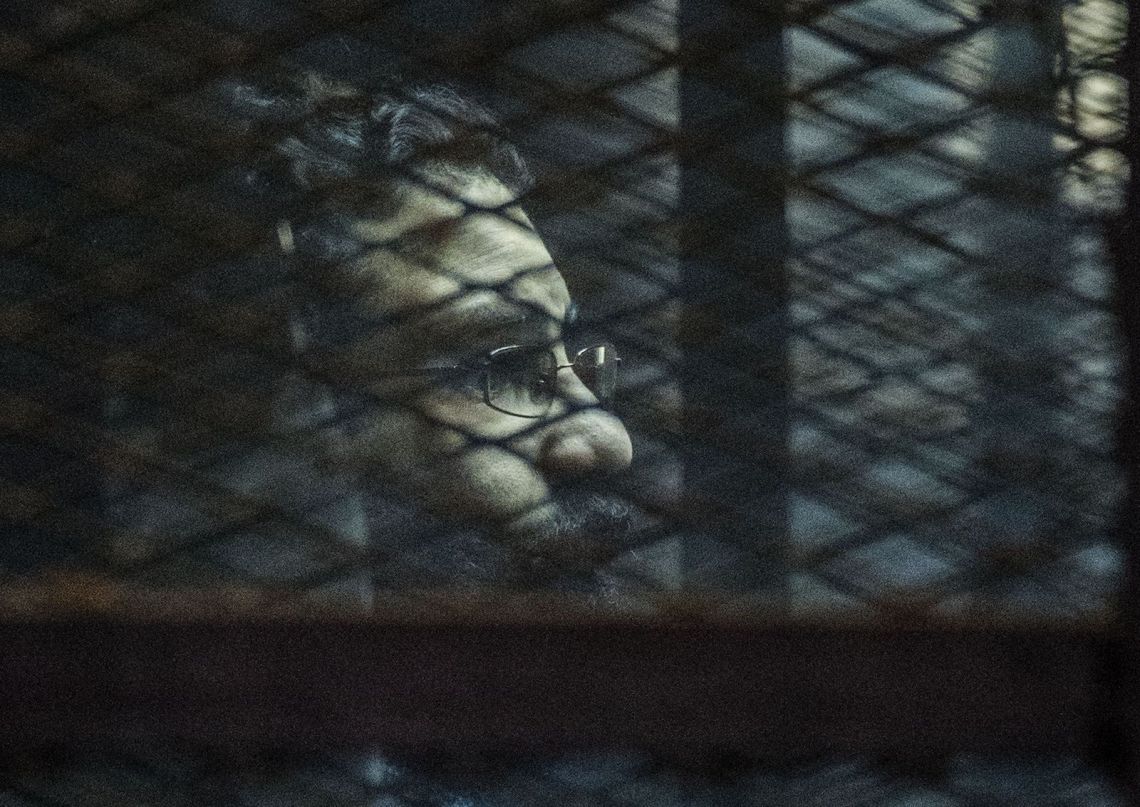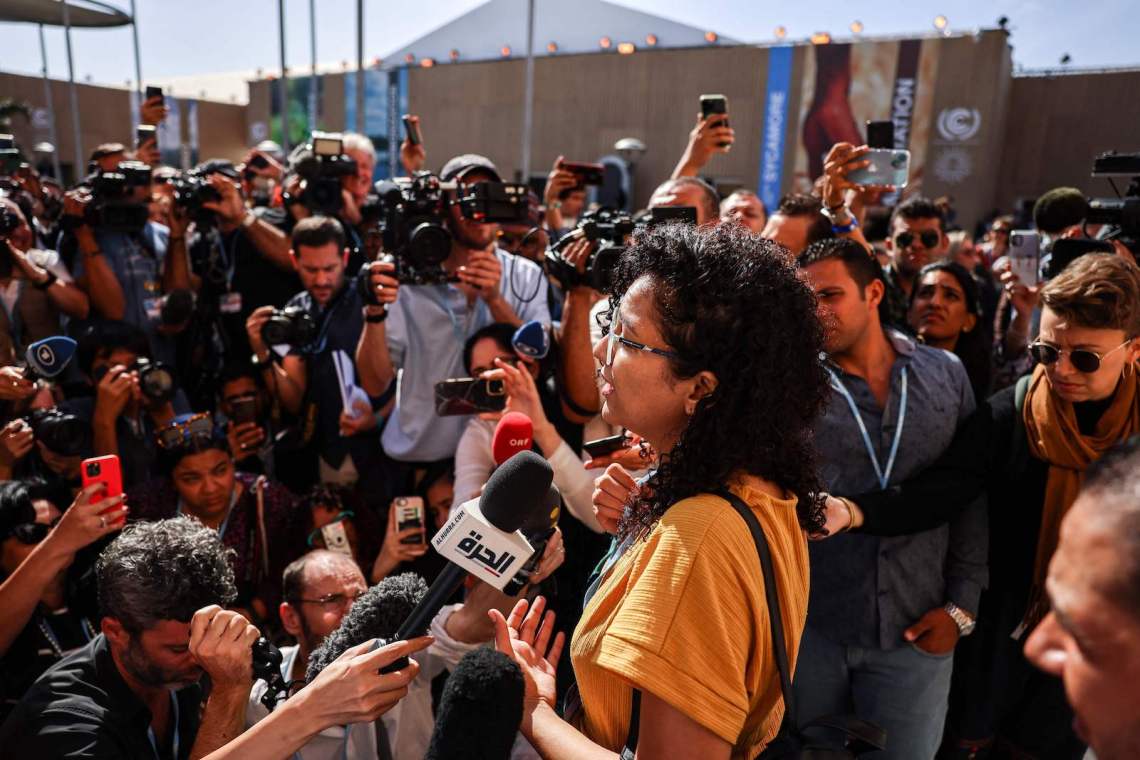I want to believe that everyone knows the facts of this story by now. Alaa Abd el-Fattah, forty years old, British-Egyptian dual national, computer programmer, human rights advocate, and father to a ten-year-old. Currently languishing in an Egyptian prison, on day 225 of a hunger strike and day six without water, in protest of his prison conditions and the denial of his right, as a British citizen, to access his consul.
Alaa—he is a friend—was arrested on September 29, 2019 as part of a crackdown on government critics and the human rights community, along with approximately 2,300 opposition party members, journalists, and young men simply wandering the streets. The sweep came on the heels of a flash protest in downtown Cairo, instigated by an Egyptian building contractor who had worked with the armed forces and posted videos from his exile in Spain detailing the excesses of the government’s spending (most notably on palaces by the current president, Abdel Fattah el-Sisi). His videos, calling on Egyptians to take to the streets again, had gone viral.
This is Alaa’s eighth detainment under four governments. His first was in May 2006. He was taken during a protest calling for an independent judiciary and released forty-five days later. In 2011, just after the ouster of Mubarak and during a period of transitional rule by the Supreme Council of the Armed Forces, he was detained for two months on charges of inciting violence against soldiers in clashes against Coptic Christian protesters. In 2013 he was arrested three times under accusations of, respectively, “inciting aggression” during a protest outside the Muslim Brotherhood headquarters, setting fire to the headquarters of a presidential candidate, and protesting in defiance of the law and “attacking public servants.” He was arrested on these last charges twice again, in 2014 and then in 2015, when he was handed a five-year sentence.
Alaa had completed that sentence and was six months into a five-year probation, which required him to check in every evening to a local police station and spend the night there, when he was arrested in 2019. He was taken from the station where he had been under watch—effectively kidnapped—and held for two years in pretrial detention before being put through an emergency court proceeding and given another five-year sentence, on charges of spreading false news that undermined national security. He had shared, along with hundreds of other people, a Facebook post written by someone else about an inmate who had died in solitary confinement at the prison. Alaa’s comment on the post when he shared it to his page was that the inmate’s death was a crime.
Before his arrest Alaa had been spending most of his waking hours with his son, who was born during one of his imprisonments. I would see them at the local swimming pool, at the children’s playground, or sitting in the sun with family and friends, making the most of his hours of freedom before he would have to rush off to turn himself in. The question of why he was imprisoned when he was already under the state’s close supervision is natural. Yet Alaa’s case has never been about what he did but rather who he is, what he represents.
*
Alaa comes from a family of well-known activists. His father, who died during one of Alaa’s imprisonments, was a prominent human rights lawyer and the director of the Hisham Mubarak Law Center, and was himself imprisoned four times under two presidents. His mother, Laila Soueif, a professor of mathematics, is perhaps the most vocal and visible of human rights advocates in Egypt and a leading figure of the country’s left. His younger sisters have also inherited the gene: the youngest, Sanaa, has been imprisoned three times, and Mona, a biologist and cancer researcher, spearheaded a campaign to abolish military trials for civilians in the aftermath of the revolution. This is a family with which the government would rather not have to contend.
When the revolution broke out in 2011, taking Egypt and the world by surprise, the media immediately turned to the family—with questions, for answers, for a story. In many ways his parents had been working toward this moment since long before Alaa was born. But he—twenty-nine years old at the time, deeply political, outspoken, a bibliophile, as eloquent in English as Arabic, and one of the country’s earliest bloggers—was the natural person to interview and quote. He was quickly thrust into the spotlight and became one of the faces of the uprising.
I think it would be fair to say that nobody quite understood, or understands to this day, what propelled millions of Egyptians, after living for decades under harsh economic conditions and an oppressive political climate, to take to the streets as they did then. Much happened after those first euphoric weeks of the revolution and after Mubarak was ousted, as the Muslim Brotherhood rose to and eventually fell from power. But one thing was certain: no government entity, and certainly not the Egyptian Armed Forces, ever wanted 2011 to happen again. It is largely for this reason, and because he continues to call for a radical overhaul of the political system in his writing, that Alaa remains in prison. Incarceration is the government’s attempt to remove his voice, and his revolutionary persona, from the political playing field.
Advertisement
Yet in the course of the better part of a decade of imprisonment, Alaa has continued to produce writings—letters, essays, manifestos—that have been smuggled out of his various cells. I have always wondered how, but never dared to ask. His writing has documented everything from the prison experience to fatherhood and his thoughts on the possibility of an inclusive national agenda even under the conditions of a repressive state. It was at some point last year that Alaa was denied pen and paper, and in April he began his hunger strike as a mode of resistance—the only means he had left to be heard. It was an urgent call for help.
His decision to escalate to a dry fast to coincide with the opening day of the UN Climate Conference, currently being held in the Egyptian resort town of Sharm El Sheikh, was as astute as it has been risky. Alaa knew that his water fast would put a crisis into motion—with his family, with the media, with the dignitaries and human rights defenders and NGOs gathered in Egypt for COP27. Without water, the body can only survive for several days.
*
Although his case has been all over the international media and discussed at the highest levels of government—Emmanuel Macron, Rishi Sunak, Nancy Pelosi, and Olaf Scholz have all raised it with President Sisi, though perhaps not forcefully enough—the Egyptian government has been steadfast in denying anyone access to Alaa and declining to either acknowledge his fast or recognize his status as a British citizen.
As I write this, there is a total lack of information about Alaa’s physical condition. His mother has sat outside the prison every day since his water strike began, sometimes for up to ten hours, waiting for information or confirmation that he is still alive. On Thursday, when she arrived at the prison, according to the family’s posts, she was told that Alaa had undergone a “medical intervention” and was asked to leave. Alaa’s lawyer, who arrived later in the day after securing a visitation permit for which he had applied the week before, was denied entry and told that the document allegedly bore the wrong date. A statement released that night by the prosecutor’s office, which referred to Alaa as a “resident,” stated that he was “in good health,” that “his vital signs…put in doubt that he is on a hunger strike,” and that he did not need to be transferred to a medical facility, as his family has requested. It also claimed that his mother had visited him in person on November 7, when in fact her last authorized visit had been on October 17.
Alaa’s sister, Sanaa, who camped outside Westminster for more than two weeks to lobby the British government to escalate her brother’s case with its Egyptian counterpart, flew to Sharm El Sheikh at the start of COP27. There she has held some of the event’s most widely attended press conferences. A few days ago she told a crowd, “Whatever happens, I feel like Alaa has won the symbolic battle by your show of support.”
She is right in the obvious ways. Alaa has won the battle against censorship—that is undeniable. His story is being considered at the highest levels of international government. Every significant human rights organization, including the UN, has issued statements in support of his release. Civil society groups around the world—nuns, mothers, climate activists, techies, artists, famous actors—have put out messages calling for his freedom. Last night his sister Mona released an impassioned public letter imploring President Sisi to give him a “presidential pardon,” as he has done for other high-profile political prisoners in recent weeks. With the spotlight so tirelessly focused on Alaa’s case, such a pardon would no doubt be in the country’s interest.
But where Alaa loses—where we all still lose, regardless of how this ends—is in the harsh reality that those in power make obstinate and vengeful decisions. Despite the outcry for his release, or at the very minimum a consular visit, we still have no information about where or how he is. There has been no accountability. It seems clear that the Egyptian government has no intention of caving to international pressure if they can help it, and in a sense their gamble is as big as his. It is a question of who can get through COP27 intact. In the government’s case, “intact” means with its biggest trade and aid partners still close in hand. In Alaa’s, it is a matter of life or death. Although Alaa would say that we, those of us on the outside, have “not yet been defeated,” it feels to me on most days like we have.
Advertisement



